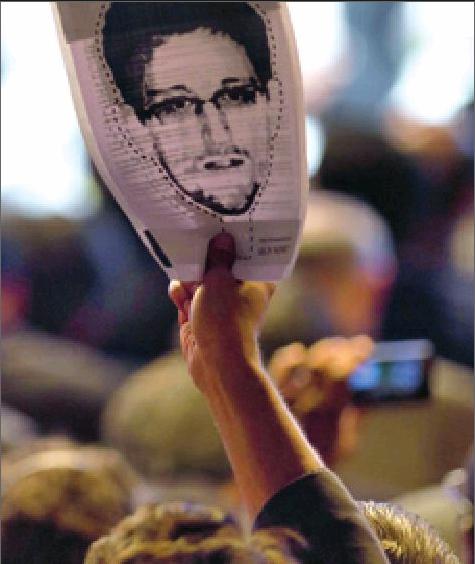Haste Makes Waste
2014-07-28ByLiYan
By+Li+Yan

Washington broke out in full legalistic fury and filed judicial litigation against five Chinese military officers on May 19, accusing them of hacking into U.S. corporations networks to steal trade secrets.
In fact, the U.S. Government has sought to include the so-called “cyber threat from China” into judicial and legislative fields since 2013. On February 20, 2013, it issued a report titled Administration Strategy on Mitigating the Theft of U.S. Trade Secrets, establishing a strategy to prevent foreign competitors and governments from stealing trade secrets by any method including via cyber space. While claiming “cyber spying”has become a major threat to U.S. cyber security, the United States widely singles out China as a cyber threat and accuses the Chinese military of hacking.
Feeling insecure
Filing lawsuits is not Washingtons ultimate goal. It conceded that the lawsuit was aimed at conveying a public message to China and forcing Beijing to “take actions.” But why did Washington abandon the existing ChinaU.S. cyber security working group and dialogue mechanisms, only to take such a provocative unilateral action? The reason is that todays cyber world may not follow what is in accordance with Washingtons strategic conception and arrangement. Washington has clearly become anxious as China poses a strong challenge to U.S. interests in cyber space.
Cyber security has undoubtedly been at the core of Washingtons multiple interests in cyber space. The U.S. security concept changed following the September 11 terrorist attacks in 2001. Former U.S. Secretary of Defense Donald Rumsfeld once said there is no way for the country to find out when and where U.S. interests would be attacked, or when Americans would be at risk of terrorist attacks. Its sense of insecurity is particularly strong in the realm of cyber space.
In one way, the United States has realized the fragility resulting from high reliance on the Internet. By carrying out a cyber military buildup, it seeks to develop deterrent and preemptive cyber strength, so as to obtain absolute military advantage—all compiled in cyber space. In another way, it has learned that the Internet has developed beyond any countrys control, such that related problems can only be solved through international cooperation and coordination. To maximize U.S. interests, the country has kept control of rights to distribute important Internet resources and formulate technical standards in the cyber world, aiming to firmly hold dominance over the Internet.endprint
China has been targeted as Washingtons top imaginary rival as the latter pursues dom- inant military strength in the cyber world. One explanation of U.S. behavior is todays strategic architecture in which China is rising as a strong power. Another reason is that the United States believes China is highly capable of conducting cyber warfare. An investigation of the U.S.-based Foreign Affairs magazine showed that Chinas capabilities of cyber warfare are second only to the United States. Therefore, the United States finds learning the real strength of the Chinese militarys cyber attack and defense abilities is crucial to its security. During talks with Beijing about Internet issues, Washington repeatedly requested China enhance transparency of cyber space and establish a mutual trust mechanism, citing the need to“eliminate miscalculation.” It also suggested carrying out direct dialogue between the two countrys military forces.
However, since the related mechanisms have just been formed, they have yet to satisfy Washingtons strategic needs. By exaggerating recent events, Washington intends to observe Beijings reactions, so that it can uncover Beijings stance and its Internet coordination and response mechanism. By choosing military officers as the trigger, Washington may try to force the Chinese military to directly respond, which will facilitate its intended test.
Damaging cooperation
It is well known that the U.S. PRISM surveillance scandal has had a great impact on international cyber space development. One direct consequence is that countries have realized the urgency to efficiently guarantee their rights in cyber space. They have opposed the United States dominance in cyber affairs, demanding shared governance of the Internet. They have also called for reforms of the Internet, such as the globalization of the Internet Corporation for Assigned Names and Numbers (ICANN). In this context, the United States was forced to adjust its policies, and agreed to shift responsibility for overseeing the ICANN to “the global multistakeholder community.” The international community believes that the coming two years will be a key period for remapping territory in the cyber world.
Currently, China is actively involved in the reform of cyber space governance. It has made suggestions at international events and its ideas have been accepted by more and more countries. Identifying with Chinas stance, many countries appeal to let international organizations with greater legitimacy, like the UN, be responsible for international Internet-related issues, so as to promote justice and fairness in the cyber world. Now China has become a significant player in cyber space governance reform, which Washington views as a threat. By mak- ing accusations against the so-called spies from the Chinese military, the United States most likely intended to damage the Chinese Governments reputation, distract its focus, and disrupt Chinas plan to participate in global Internet affairs.
However, haste generally makes waste. Washington is hurrying to test Beijings reacting mechanism, but has instead destroyed a bilateral cooperative mechanism, into which they have invested an enormous amount of time and energy. Furthermore, by ignoring international principles and stirring conflicts, it will cause damage to international cooperation over cyber space.
Chinese President Xi Jinping called for building a China-U.S. “new-type major-power relationship” characterized by non-confrontation, mutual respect and win-win cooperation during a meeting with his U.S. counterpart Barack Obama in June 2013. If the United States continues to act the way it has, much greater efforts will be necessary to extend such a relationship into cyber space.endprint
